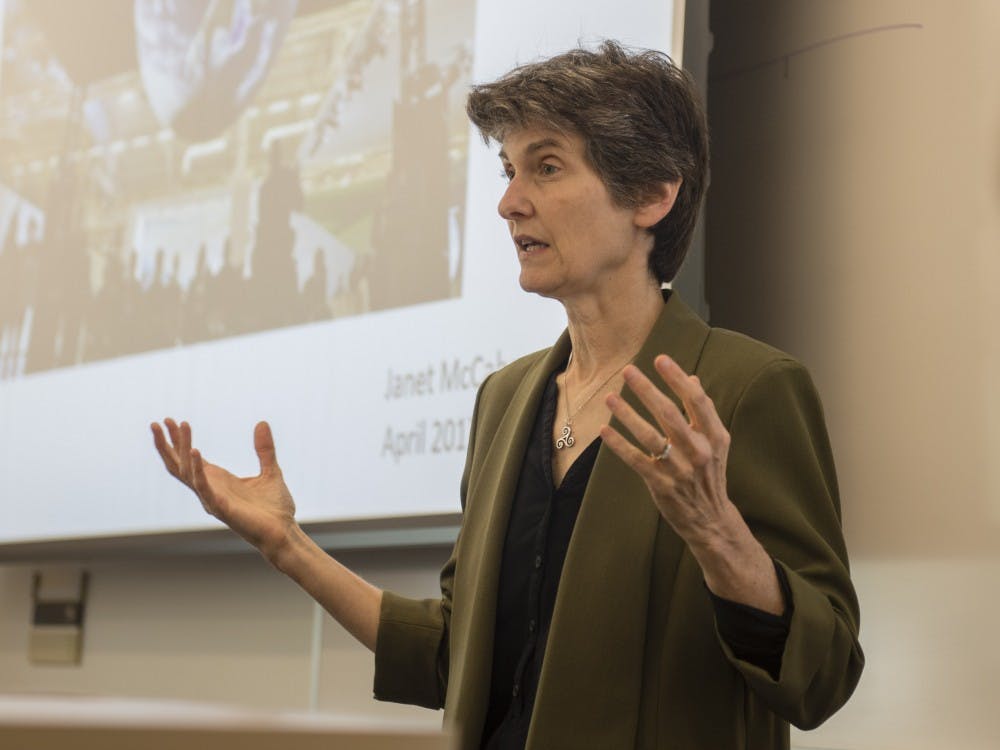Janet McCabe, a former head of the Environmental Protection Agency, addressed how the new presidential administration will set back environmental progress at “Environmental Policy and the Trump Administration” Monday evening in the School of Public and Environmental Affairs.
McCabe was the air and radiation administrator for the Obama administration and came to speak as part of SPEA’s celebration of Earth Week.
“Frankly, what’s disturbing about the kinds of messages that we’re hearing from the new administration is their lack of interest in continuing to develop environmental sciences,” McCabe said.
McCabe welcomed students into the classroom, where students filled every seat in the room, the aisles between the seats and the front of the room.
Erica Penna and Amy Rowland, first-year SPEA graduate students, said they came because they think it’s important to engage with speakers and learn more about potential jobs in their field.
“The uncertainty from the election has made me want to interact with people who have been there,” Rowland said.
McCabe said there was a change in environmental perception when environmentalists and naturalists realized humans were harming nature with pollution and chemicals.
“Back in the middle of last century, things were looking pretty grim,” she said. “There was trash on the beaches, rivers were catching on fire.”
McCabe said the 1970s were fundamental years during which environmentally friendly policies were passed, such as the Clean Air Act and Clean Water Act.
Since then, McCabe said technologies, such as scrubber plants, solar power panels and wind turbines, have been developed to advance the practices of environmental sustainability.
“We all can live in ways that cause less pollution,” she said. “That is more true than ever as we look forward.”
McCabe said the more information regarding the negative effects of emissions within the environment there is, the more younger generations are making changes to environmental practices. She said being environmentally conscious has become habitual for younger generations, like wearing a seat belt.
“It seems frustrating that it should take so long for us to fully bake this into our lives,” she said.
Humans don’t have the same apparent land pollution they did a few decades ago, McCabe said there are still concerns regarding environmental health.
McCabe said this is particularly a concern for chemicals people can’t see because it’s more difficult to make people take action.
McCabe said you can’t see mercury or lead, but they are both common threats to people. She said the poorer the area, the more prominent the threat is for citizens.
McCabe said during the Obama administration the EPA accelerated its process because former president Barack Obama was passionate about the state of the environment.
“President Obama really cares about climate change,” she said. “When he speaks about this, you know he is speaking as a father, as a future grandfather.”
Throughout the course of the Obama administration, the EPA administration regulated the production of cars, semi-trucks, oil and gas, landfill methane and power plants. McCabe said these are all contributing factors to global warming.
However, McCabe said the Trump administration has already started to reverse some of these regulations.
McCabe said under the Trump administration, the EPA budget proposed cutting funding for research and development.
She said the passing of this budget would mean there will be fewer grants available for institutions that research the environment and collect data about its condition.
McCabe said although the current administration is disregarding the state of the environment and not taking action, this is not a reason to give up on the future.
She said there is a resurgence in activism, which causes congressmen to take action and students to be interested in environmental studies.
“Environmental protection is about people,” she said. “It’s about community.”






